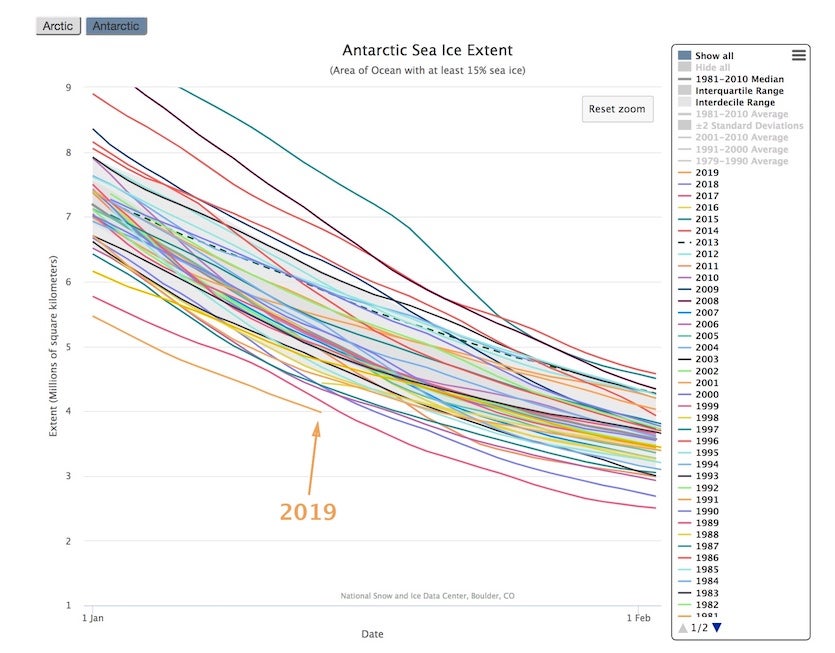Antarctic Sea Ice Extent Challenging Record Lows In January - Usual Low February/March
 Above: Antarctic sea ice photographed during the four-year Southern Ocean Carbon and Climate Observations and Modeling study, which used oceanic floats to monitor carbon dioxide and track other key variables. The photo was taken during January, when the region's seasonal ice cover is dropping toward the annual minimum that occurs in late February or early March. Image credit: Hannah Zanowski/University of Washington/Flickr.
Above: Antarctic sea ice photographed during the four-year Southern Ocean Carbon and Climate Observations and Modeling study, which used oceanic floats to monitor carbon dioxide and track other key variables. The photo was taken during January, when the region's seasonal ice cover is dropping toward the annual minimum that occurs in late February or early March. Image credit: Hannah Zanowski/University of Washington/Flickr.
Just two years after shrinking to its lowest extent ever measured, Antarctic sea ice may challenge that record a few weeks from now. This depletion comes just as scientists reported a harrowing sixfold increase in the loss of Antarctic land ice over the last 40 years. Unlike land ice, the loss of sea ice doesn’t contribute to sea level rise in itself, but it could help make some of Antarctica’s land ice more vulnerable (see below).
The extent of ice cover encircling the Antarctic coast began taking a nosedive in December, dropping even more quickly than usual for the time of year (late spring in the Southern Hemisphere). Since December 25, Antarctic ice extent has set calendar-day record lows every day for more than three solid weeks. Satellite-based records from the National Snow and Ice Data Center go back to 1979.
Typically, Antarctic ice reaches its minimum for the year in late February or early March (late summer). As of Monday, January 14, the extent was 3.979 million sq km, which is well below the value of 4.154 million sq km observed on that date in 2017. We still have a few weeks to go before 2019’s extent can challenge the lowest value measured at any time of year: 2.110 million square kilometers, observed on March 3, 2017.
A new all-time record-low extent isn’t yet a slam dunk, according to polar climate expert Cecilia Bitz (University of Washington). “The minimum won't happen for another 40 days or so, and the weather between now and the minimum could shrink or grow the margin that exists today,” Bitz said in an email.
 Figure 1. Antarctic sea ice extent has been running well below all other years during the first two weeks of January 2019. Image credit: National Snow and Ice Data Center.
Figure 1. Antarctic sea ice extent has been running well below all other years during the first two weeks of January 2019. Image credit: National Snow and Ice Data Center.
EDIT
https://www.wunderground.com/cat6/Antarctic-Sea-Ice-Dips-Record-Low-Extent-Early-January

